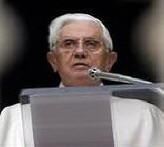|
Pope Benedict XVI- Angelus |

Angelus
On Casting Stones
"Let Us Learn
... Not to Judge and Not to Condemn Our Neighbor"
H.H. Benedict XVI
March 21, 2010
www.zenit.org
Dear Brothers and Sisters!
We have arrived at the 5th Sunday of Lent in which this year the liturgy
proposes to us the Gospel episode of Jesus saving the adulterous woman
condemned to death (John 8:1-11). While he is teaching in the Temple
area the scribes and the Pharisees bring to Jesus a woman caught in
adultery, for whom the Mosaic Law prescribes stoning.
These men ask Jesus to judge the woman with the purpose of "putting him
to the test" and trip him up. The scene is full of drama: the woman's
life and Jesus own life depend on his words. The hypocritical accusers,
in fact, pretend to entrust him with the judgment while in reality they
want to accuse and judge him. But Jesus is "full of grace and truth"
(John 1:14): He knows what is in every man's heart, he wants to condemn
sin but save the sinner, and unmask hypocrisy.
There is a detail that is highlighted by the evangelist St. John: While
the accusers question him insistently, Jesus bends down and starts
writing with his finger on the ground. St. Augustine observes that this
gesture displays Jesus as the divine lawgiver: Indeed, God wrote the law
with his finger on the tables of stone (cf. Commentary on the Gospel of
John 33:5). Thus, Jesus is the lawgiver, justice incarnate. And what is
his judgment? "Let the one among you who is without sin be the first to
cast a stone at her."
These words are full of the disarming power of the truth, which makes
the wall of hypocrisy crumble and opens consciences to a greater
justice, that of love, in which consists the perfect fulfillment of
every precept (cf. Romans 13:8-10). It is justice that also saved Saul
of Tarsus, transforming him into St. Paul (cf. Philippians 3:8-14). When
the accusers "departed, one by one, beginning with the elders," Jesus,
absolving the woman of her sin, introduces her into a new life, oriented
toward the good: "Neither do I condemn you; go and from now on do not
sin any more." It is the same grace that will make the Apostle say: "I
only know this: forgetting what is behind and looking to that which is
ahead, I race toward the goal, to the prize that God is calling me to
receive above in Christ Jesus" (Philippians 3:14).
God only wants goodness and life for us; he provides for the salvation
of our soul through his ministers, freeing us from evil by the Sacrament
of Reconciliation, so that no one is lost but all have a way to be
converted. In this Year for Priests, I would like to exhort pastors to
imitate the holy Curé d'Ars in the ministry of sacramental Penance, so
that the faithful rediscover its meaning and beauty, and are again
healed by the merciful love of God, who even "forces himself willingly
to forget sin," so that he can grant us his forgiveness!" ("Letter
Proclaiming a Year for Priests").
Dear friends, let us learn from the Lord Jesus not to judge and not to
condemn our neighbor. Let us learn to be intransigent with sin --
beginning with our own! -- and indulgent with people. May we be helped
in this by the Holy Mother of God, who, free of every fault, is the
mediatrix of grace for every contrite sinner.
[After the Angelus the Pope greeted the pilgrims in various languages.
In Italian he said:]
Next Sunday, Palm Sunday, is the 25th anniversary of the beginning of
the World Youth Days, launched by the venerable and beloved John Paul
II. For this reason, on Thursday, at 7:00 p.m., I expect to see many
young people of Rome and Lazio here in St. Peter's Square for a special
celebratory gathering.
[In English, he said:]
I greet all the English-speaking pilgrims and visitors present at
today's Angelus. May your stay in Rome help to deepen your love for
Jesus Christ, who gave his life for love of us. In today's Gospel we
hear of his compassion for the woman who was caught committing adultery.
While acknowledging her sin, he does not condemn her, but urges her to
sin no more. Trusting in his great mercy toward us, we humbly beg his
forgiveness for our own failings, and we ask for the strength to grow in
holiness. Upon all of you, and upon your loved ones, I invoke God's
abundant blessings.
© Copyright 2010 -- Libreria Editrice Vaticana
Look
at the One they Pierced!
This page is the work of
the Servants of the Pierced Hearts of Jesus and Mary